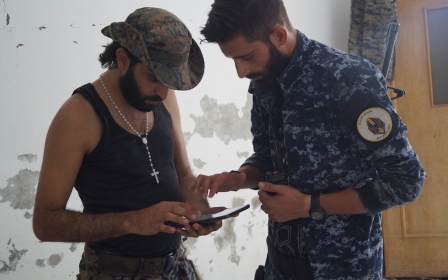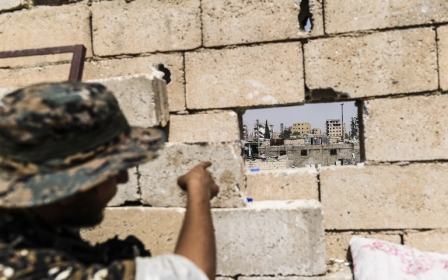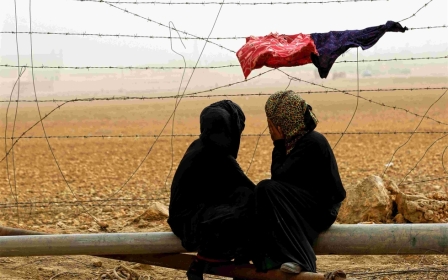US-led coalition rejects UN call for Raqqa pause, says battle must continue

AIN AL ISSA, Syria – The US-led coalition fighting against the Islamic State group in Raqqa has rejected a UN call for a humanitarian pause in the fighting, with commanders telling MEE that it would only cost more civilian lives.
The UN estimates 10,000 to 20,000 civilians remain trapped in the city, enduring dire conditions and surviving on dwindling supplies, as the Syrian Democratic Forces, a US-backed coalition of Kurds and Arabs slowly wrests back control from IS.
Since the campaign to seize Raqqa began, rights groups and observers have reported high civilian casualties resulting from coalition air strikes, with 100 deaths reported in one 48-hour period last week.
"The tolls are high because the air strikes are hitting neighbourhoods in the city centre that are densely packed with civilians," Rami Abdel Rahman, the UK-based director of the Syrian Observatory for Human Rights, told AFP news agency.
Last week, UN special adviser Jan Egelend said “I cannot think of a worse place on earth now than in these five neighbourhoods and for these 20,000 people,” and urged the coalition to pause fighting, to let people escape.
“Now is the time to think of possibilities, pauses or otherwise that might facilitate the escape of civilians, knowing that Islamic State fighters are doing their absolute best to use them as human shields,” the senior UN aid official added.
He urged the coalition to “do whatever is possible to make it possible for the people to escape”.
But, having reclaimed around 60 percent of the city – which was once the jewel in the crown of IS’s so-called caliphate – coalition and SDF officials say that delaying the fighting would only help IS to regain energy, reorganise, and would cost more civilian lives.
Currently, IS is completely besieged by the SDF, with no way out.
Going slower only delays the liberation and subsequently costs more civilians their lives
- US Colonel Joe Scrocca
“Going slower only delays the liberation and subsequently costs more civilians their lives,” US Colonel Joe Scrocca, director of public affairs for combined Joint Task Force-Operation Inherent Resolve (CJTF-OIR) told MEE, in an interview.
“The coalition agrees that civilians must be protected, and that is why you see coalition and our partnered forces putting their lives at risk to save civilians every day. There is a delicate balance,” he said, adding that, “There is no perfect formula.”
“Commanders must manage the speed of operations so as to balance the need to accomplish the mission with the risk to their own forces and the protection of infrastructure and non-combatants.”
The coalition says IS snipers are deliberately gunning down women and children, and civilians are starving as they wait to be rescued.
“In many cases the only hope for civilians is that liberation forces get to them quickly before they starve to death or are shot in the back by ISIS while trying to flee,” Scrocca said.
“The only way to save the people is to liberate them from ISIS. The longer this takes the more the people will suffer under ISIS,” he added.
IS not allowing civilians to leave
Omar Alloush, a senior official in the SDF-affiliated Civil Council of Raqqa, stressed to MEE that civilians were warned before the start of the Raqqa operation.
“We warned them through the radio to the people to get out and distributed leaflets and said there would be a big fight,” he said.
“Those who did not leave, stayed to steal, to help Daesh (IS), or they have not the ability to get out,” he added, speaking to MEE at his office n Ain al Issa, a few hours away from Raqqa.
According to the official, civilians would be prevented from leaving the city now by IS, even if there were a pause in fighting.
“The reason for our delays in liberating Raqqa is the presence of civilians inside the city. If we know that the civilians will be able to leave, we will stop the fighting, but Daesh doesn’t allow them to leave, because they use them as human shields,” he said.
According to the official, only 5,000 to 7,000 remain in the city, a much lower estimate than the UN, which cannot be verified.
“Daesh doesn’t want the civilians to come out, if the coalition opens the way for them,” said Idris Mohammed, one of the leaders of the Raqqa Internal Security Forces (RISF) that will police Raqqa after it’s liberated.
“There are 10,000 civilians inside the city, if we do not help them, no one will help them,” he added.
Our progress is slow due to the presence of civilians, not because of IS
- Idris Mohammed, a leader of the Raqqa Internal Security Forces
“Our progress is slow due to the presence of civilians, not because of IS,” he said.
“If there are no civilians, I can say we will liberate Raqqa within 10 days,” he added, suggesting that this is one of the reasons IS would never allow civilians to leave.
At the end of the Manbij operation in August last year, the SDF allowed the remaining IS fighters to escape the city with hundreds of civilians in order to end the fighting and save the city from more destruction.
But it seems unlikely this will happen in Raqqa, as the city is much more strategic for IS, officials such as Alloush say.
Coalition officials have stressed their view that those IS members remaining in Raqqa face a choice between surrendering or dying in the city.
“Because there are civilians used by Daesh as human shields and a large number of tunnels and suicide bombers, the fighting is heavy,” said Mustafa Bali, an SDF media official.
“Raqqa is one of the last cities of Daesh, so they are defending it,” he added.
Situation in Raqqa dire
For those civilians that remain in the city, the situation is undeniably dire – and aside from the humanitarian situation, residents must also contend with brutal IS tactics, including sniper fire and mines.
According to an assessment of the NGO Reach published on 17 August, the situation in the remaining populated neighbourhoods of Raqqa continues to deteriorate.
“Residents face constant threats to their safety including air strikes, indirect fire, improvised explosives, mines, and sniper fire,” the report said.
Moreover, residents are relying on food stored in the past since fresh food and water is almost not available.
The UN adviser Egeland also called on the coalition not to attack boats that are being used to escape.
“You know, boats on the Euphrates must not be attacked, people that come out cannot risk air raids when they come and where they come,” Egeland stated.
Earlier in the campaign to take the city, the US commanding general for the operation, Lieutenant General Stephen Townsend said they would "shoot every boat we find. If you want to get out of Raqqa right now, you’ve got to build a poncho raft.” (A poncho raft is a US Marine improvised raft made of two ponchos tied together.)
Amnesty International has also called on the US-led coalition and US-backed SDF forces to ““fire only on targets known to be hostile and end the practice of engaging an entire class of civilian objects, such as boats.”
Need to protect civilians
In its recent report, Amnesty urged the coalition and the SDF to “take all feasible precautions to minimise harm to civilians, including giving effective advance warnings of impending attacks to the civilian population in the concerned areas.”
Hana, a mother of four who fled Raqqa in early June, told Amnesty that her cousin Yasser, a father of two young children who worked transporting people fleeing the city across the river, was killed in an air strike around 10 June.
“A plane hit the boat and killed him and two women and a man he was transporting. He had taken me and my family across the river a few days earlier. That is what he did, he helped people to flee,” she said.
“He took a big risk because the punishment Daesh imposes for this is death, but in the end he was killed by an airplane,” she added.
However, Colonel Scrocca denied that the coalition targets civilians.
“The coalition only targets watercraft operated by ISIS fighters. The coalition uses many different means to distinguish between civilians and ISIS fighters, which includes visual identification through aerial surveillance,” he said.
“The coalition takes extraordinary efforts to identify and strike military targets in a manner that minimises the risk of civilian casualties. The avoidance of civilian casualties is a priority when conducting strikes against legitimate military targets with precision munitions, unlike the indiscriminate nature of ISIS tactics which result in an enormous number of avoidable civilian deaths,” he added.
Stay informed with MEE's newsletters
Sign up to get the latest alerts, insights and analysis, starting with Turkey Unpacked
Middle East Eye delivers independent and unrivalled coverage and analysis of the Middle East, North Africa and beyond. To learn more about republishing this content and the associated fees, please fill out this form. More about MEE can be found here.







